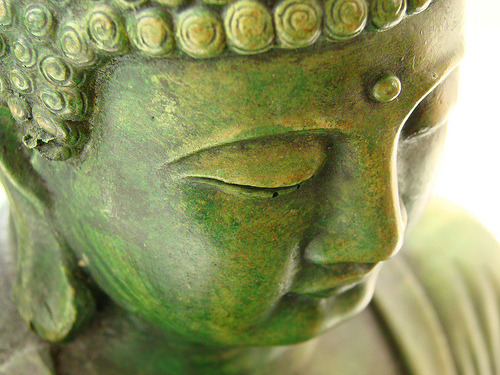Hi all, I have been very busy of late
plunging in to the mysteries of consciousness. Of course, its all
pretty weird and strange, there seems to be no answer to be found in
analyses but I have learned a lot and hope fully this should
translate in to some useful discussions soon. I have written a few
blog pieces but I feel they are incomplete, so have neglected to
post up any works in progress.
However, I am going to run a mini
series of replies from questions that were posed to me by a critic. I
had never really applied my own analysis to such questions, Ruthless
Truth had previously provided the stock responses, but I believe
these are pertinent questions that have never been fully addressed.
You asked me
what I think you are doing.
I
think you are going down the same route many Eastern philosophies
are. You are trying to reach Nirvana by rejecting the 'I'. If
this is indeed a faulty assumption on my part, then I am more than
willing to be corrected.
Lets break this
question in half. First of all I shall consider the Eastern route and
see if I can draw any parallels and difference with what we are
doing. I shall talk about the idea of nirvana and where we stand in
relation to this concept, in next weeks article.
So lets begin by
stating on the record we are not going down the same route as Eastern
philosophies are. We have consistently denied this right from the
start, since we do not follow with their metaphysical assumptions and
dogma.
However, there are
some striking parallels which we can draw and take a look at. In the
beginning we believed that Ciaran had cracked enlightenment and
whilst this was not the full picture, what he had discovered was
undoubtedly the core component of enlightenment.
It has been stated
before that what we termed 'liberation' at the time was equivalent to
enlightenment. It is worth asking in what ways is it equivalent? Let
us first consider the teachings of the main schools of enlightenment.

Advaitans don't
particularly like Neo – Advaitans, because they have stripped out
all the scripture, in order to transmit the message to people in a
rapid time scale. For those who don't know what Advaita is, there is
plenty of info on the web but it is basically the Hindu brand of
enlightenment. Advaitans have a hostility to Neo - Advaitans, I mean
lets face it, you would be a little miffed if you had realised that
someone had got enlightened in a short amount of time and it took you
fifteen years to do the same.
Here we have a little bickering war in
the spiritual community where Advaitans seem to think they have an
exclusive right to call themselves enlightened. I will not doubt that
what they say is untrue yet, but we will appraise this claim in next
weeks article.
The traditional
conception of enlightenment in Advaita is to break down your
conditioning which they call 'ignorance'. This ignorance merely
translates as false beliefs and bad conditioning, of which we have
been subject to.
Once you have removed your ignorance, you are worthy
to know the final truth which is basically what we call 'true self'.
This is why you tend to have spiritual people banging on about an
eternal self, and proponents of certain Indian philosophies who deny
the no self idea.
There are a few
ways of looking at this glaring contradiction. Basically the word
self is taken to mean a variety of things, so we can construe
whichever definition we fancy at the time. This however, is a simple
category mistake due to generalised terminology, where accuracy has
long been neglected.
We will highlight this thoroughly in due course
but for now, we can simply say 'no self' as our terminology construes
it, means in Advaitan circles there is a distinction between the
false self and true self. (In next weeks article, these conceptions
will be fully scrutinised).
This 'true self'
then, is actually equivalent to 'no self' but with a different name.
Whilst the Advaitans may have worked on the deprogramming of
conditioning for a longer time, basically they have the same insight
in to the self as Neo – Advaitans. Our Neo - Advaitan folk then,
have not had the benefit of breaking down their conditioning, as
their Advaitan chums have.
When we look at
Buddhism, they recognise Buddha nature as our true being, and their
doctrine is of 'anatta', or simply 'not self'. What they do is take
the concept of no self (Anatta), and systematically chip away at
their beliefs via the eightfold path and the noble truths of the
Buddhist doctrine. Whilst there are various sects of Buddhism, the
overall aim is to completely annihilate the false self.
This is
achieved by meditating on various truths and over time, slowly
undermining the premises on which the reality of the false self is
based on, which in turn, eventually leads you to truth realisation.
In Zen they use meditation on koans, which are basically riddles.
Meditations proceed until these koans trigger the sudden realisation
of no self. In that sense, Zen is the rapid enlightenment equivalent
of Buddhism, so shares some attributes with Neo - Advaita, in
relation to its parent religion.
So, these are the
common all garden varieties of enlightenment schools, although this
is not an exclusive list. There are other schools of thought, such as
yoga and tantra to name a few, and this is merely a very brief glance
at the main two religions.
Having outlined the
basics of these schools of thought, we are in a position to look at
some parallels and differences between their and our conception of no self...



















0 comments:
Post a Comment